7 April 2022 Edition
I can still hear her voice
Máire Comerford remembered
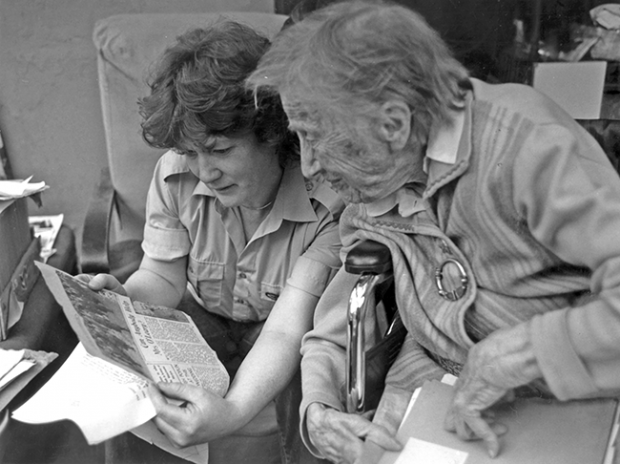
• Rita O’Hare and Máire Comerford
‘On Dangerous Ground – a Memoir of the Irish Revolution’ by Máire Comerford, edited by Hilary Dully, had a special launch in Sandyford, County Dublin at the end of March. Máire lived in the village for many years and some of her old friends and neighbours attended the launch which was organised by the local Máire Comerford Sinn Féin Cumann and publishers Lilliput Press and was hosted by Sinn Féin representative Shaun Tracey. Speakers included Hilary Dully, Mary Lou McDonald, and historians Liz Gillis and Tim Pat Coogan. Attendance included Proinsias Ó Rathaille, grandson of The O’Rahilly, and Evelyn Campbell, who sang her song ‘Fenian Women Blues’.
Rita O’Hare got to know Máire when she came to live in Dublin in 1972. Rita is a lifelong Republican activist and former political prisoner, whose roles within the Republican Movement included editor of An Phoblacht, Sinn Féin Director of Publicity, and the party’s North American representative.Here, she pays a personal tribute to Máire.
• • •
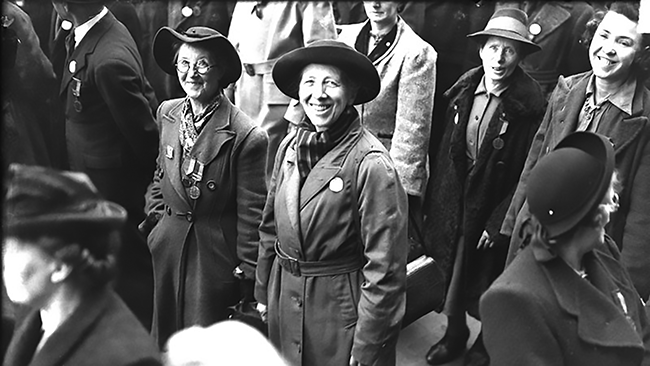
Thanks to Hilary Dully and Joe Comerford for getting Máire’s words published as they deserve to be and to Diarmuid and Shaun for organising this event and inviting me to say a few words about Máire.
I was introduced to Máire Comerford by a contemporary of hers, Sighle Humphreys, another absolutely extraordinary woman whom I met not long after I came to Dublin. It was only when I was writing these words that I realised that Máire was the same age when I met her as I am now. We three shared well over 100 years of republican activism between us.
Máire was still working on her memoirs, meeting with contemporaries of her time. She had a vegetable garden behind the cottage next door which she still worked, though it was getting hard for her. She had a wee dog that she had found injured outside her house and took him in. She called him Shinner and was heartbroken when he got knocked down and killed.
I used to walk from where we were living at the time over to Sandyford to visit her. I did not have a car so it was walk or cycle. Máire in her day travelled by pony and trap, bicycle or walked. So, she approved very much of my mode of travel to see her.
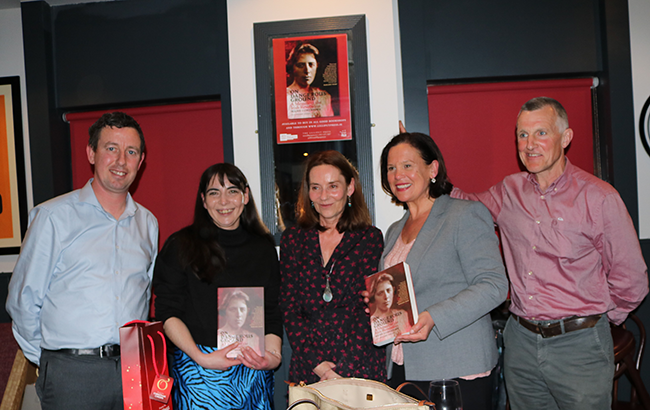
• Sinn Féin’s Shaun Tracey, Historian Liz Gillis, Editor of ‘On Dangerous Ground’ Hilary Dully, Mary Lou McDonald and Chairperson of the Máire Comerford Sinn Féin Cumann in Sandyford, Diarmuid Coogan
Our children loved to visit her with me, to hear her stories of her childhood in Wexford where they learned to ride their ponies before they could walk. Children were not taught to be afraid in those days, she told them. You learnt to ride and if you fell off, you got back on again. You did not ever whinge.
That spirit she carried with her into her fighting in the Tan War in Cumann na mBan. Máire was utterly fearless. Her appearance and accent got her out of some dangerous moments as there was an assumption that women of her class could not be involved in this revolution. How wrong they were!
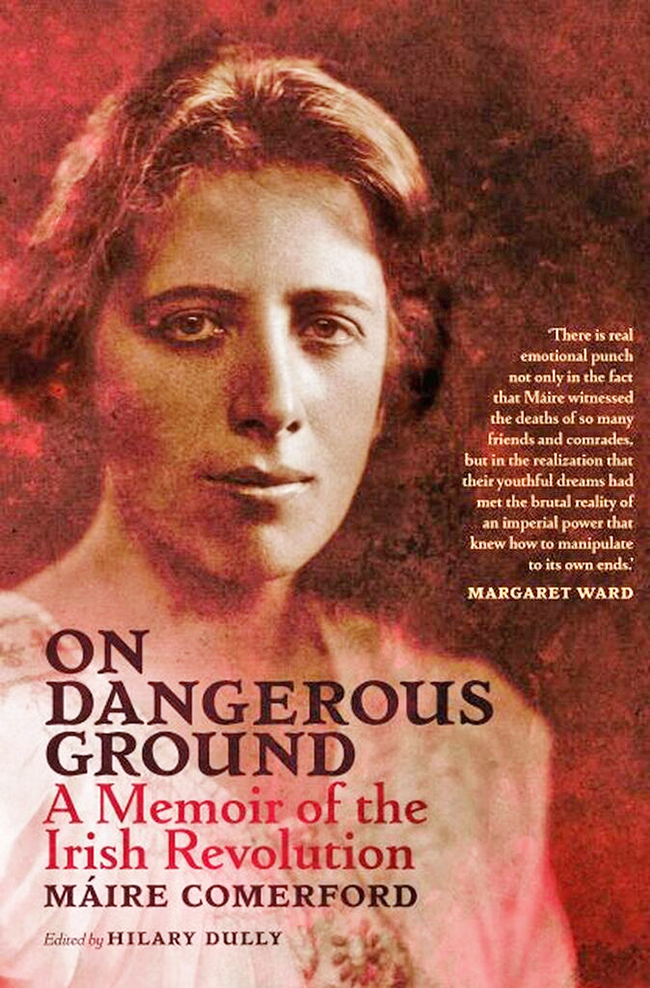
Maire, Sighle, and their contemporaries were a formidable force. They fought on the front lines, carried information and communications through enemy lines, often under fire.
Máire and Sighle and the majority of the women volunteers rejected the Treaty and fought in and were imprisoned during the Civil War. She was in the Four Courts in the thick of the attacks on it. Máire was in the Hammam Hotel with Cathal Brugha. I can still hear her voice saying these words after Brugha died, “We were tired, tired, tired and broken-hearted.”
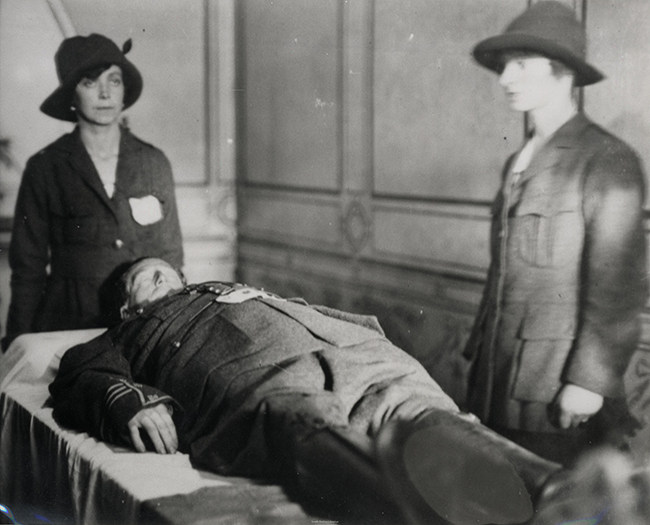
She and other Cumann na mBan women stood guard at his coffin. Her heartbreak was for all those who had died in the fight to end British rule and the betrayal of the revolution by the Treaty. The Civil War was even more heartbreak.
Máire talked often and passionately about the need to be vigilant and self-critical, of how essential communications were, and how Sinn Féin in the ‘70s had to try to overcome the difficulties that Partition posed to an all-Ireland party.
Danny Morrison visited with news of the Hunger Strikes of 1980 and ’81. She was not able to visit the H-Blocks, but my husband Brendan and I took her to Portlaoise to visit prisoners there. A former prisoner herself, she had great empathy with them.
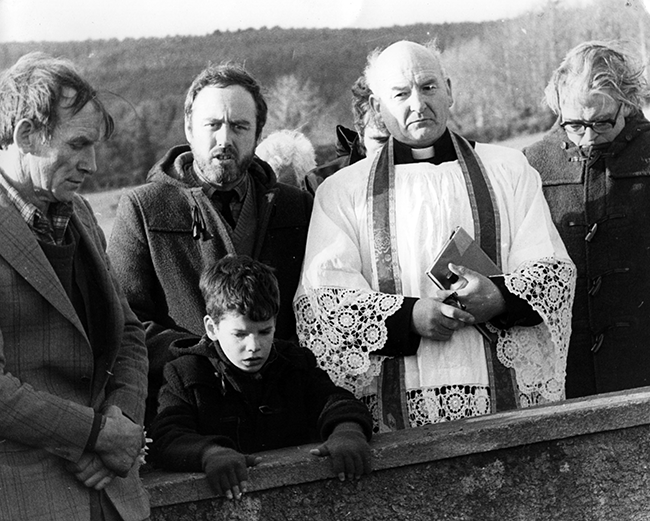
• 1982 - Danny Morrison delivers Máire's funeral oration
I was in Limerick Prison for two years from 1975 to 1977. Máire was much frailer when I saw her when I got out and eventually was in a wheelchair. She very much wanted to stay in her own home, but the house was not wheelchair friendly and so Brendan went over and widened the doorframes so she could easily get into her bedroom and bathroom.
She made all the arrangements for her funeral and wanted Danny Morrison to give her oration. She chose to be buried in Wexford on the side of a mountain where she had run a chicken farm. It was December and it snowed that day. It was very Máire; no frills, no fuss, but a funeral in a blizzard.
I will never forget her or Sighle and I think about them often, truly extraordinary republican women who fought alongside the IRA with courage and determination and on equal terms.
They stood with the Republic and never lost the belief that it would be achieved. This is a wonderful book. It is Máire speaking down through the years. I urge you all to read it.
Available from: sinnfeinbookshop.com




